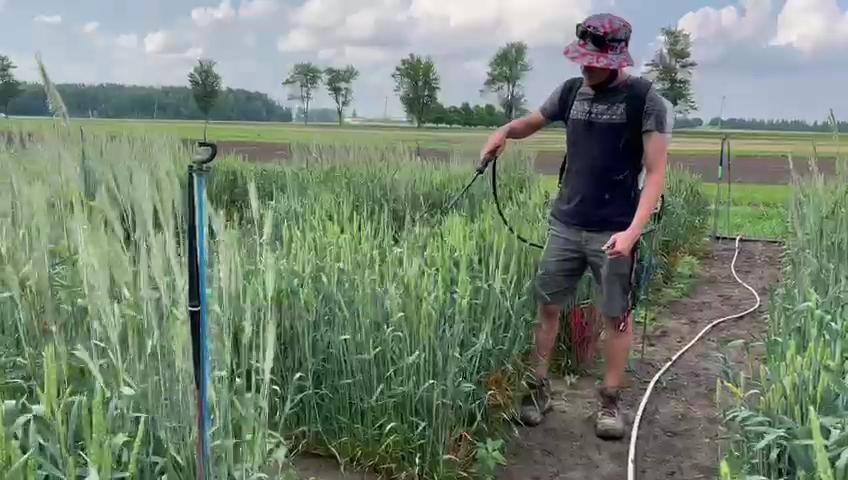Experiential learning opens new doors for U of G undergrads

Riley McConachie grew up in a small town surrounded by agriculture. While studying environment and resource management at the University of Guelph, he discovered a keen interest in research through jobs with Agriculture and Agri-Food Canada and the Canadian Food Inspection Agency.
Hannah Michaels roots didn’t reach into agriculture but her early love of horses seemed to have set her on a certain career path. She applied to the Ontario Agricultural College (OAC) and is now in her fourth year of the bachelor of science in agriculture program at the University of Guelph, majoring in animal science.

While looking for summer jobs one year, both students learned about a program that would shape their post-graduate plans. They’ve recently wrapped up research projects as part of a unique learning experience at U of G.
Through the Ontario Agri-Food Innovation Alliance, the Ontario Ministry of Agriculture, Food and Rural Affairs (OMAFRA) funds the aptly named Undergraduate Student Experiential Learning (USEL) program. USEL exposes U of G students to opportunities outside the lecture halls, providing hands-on learning of additional skills for a professional career in the agri-food sector.
“It is a pleasure to have dynamic and talented students join us in the field,” says Helen Booker, associate professor in the Department of Plant Agriculture at U of G and USEL mentor. “Training the next generation of agri-food leaders who are able to take innovation and research to the next level will provide us with a robust agri-food sector for generations to come.”
Started in 2010, USEL creates summer job opportunities for a handful of students each year to work on industry issues in collaboration with OMAFRA specialists and U of G research faculty for mentoring, coaching and advising.
“The premise is that students gain experience working on an existing research project in the agriculture industry and learn to develop and present materials that communicate results to farmers,” says Carmela Cupelli, business development specialist with OMAFRA who’s been administering the program since its inception.
Hands-on field research
What caught Michaels’s eye about one of the summer positions offered through USEL was the opportunity to work on small ruminant species – an area with little focus in her core subjects. “I jumped at the chance to work for a whole summer to learn more about sheep colostrum and lamb mortality,” she says.

Her project included invaluable experience with producers and stakeholders. “Through this project, I realized how careers in research are not just about working in a lab but that research can be interactive and collective.”
McConachie was drawn to the ability to conduct a field research project as part of the USEL experience. “I am really interested in agricultural research and wanted to be more involved in field research,” he says.
His project involved four months of summer work on breeding wheat for Fusarium head blight resistance. He says he gained more research experience than he expected.
A key part of the USEL program is developing communication materials to share research knowledge with key audiences, usually primary producers. “I think effectively communicating science-based information is perhaps as important as the research itself to ensure the Canadian agricultural industry continues to be on the cutting edge,” says Michaels.
Strengthening the agri-food sector
Interest in USEL-supported jobs continues to grow. Summer positions were initially available to OAC students and have recently expanded to the School of Engineering and the College of Biological Science. More than 70 students have participated since the program began in 2010.
“We are creating a strong affinity for the sector by helping students consider future careers in the agri-food and rural sectors,” says Cupelli.
A recent survey of USEL graduates reinforced the value of this experiential learning opportunity. “We surveyed participants from 2012 to 2020, and 96 per cent are involved in the agri-food sector from research to teaching, government jobs, private sector, agri-food processing and veterinary medicine. We are clearly filling a gap that adds hands-on skills to book skills and benefits the entire agri-food sector,” she says.
Creating new careers
After more than a decade, the USEL program continues to attract applications from as many as 60 undergrads a year eager for experience and ideas for careers in the agri-food sector.
McConachie knew he wanted to do graduate work before applying to USEL, and the experience further solidified his plans to pursue a master’s degree. “I absolutely love working in the field, and definitely want a career in agricultural research. And I know this experience will help me get a job in this field.”
For Michaels, the career path is less clear, but that’s okay with her.
“I am honestly more confused about my future career. I now realize how many possible career paths there are, and every day I seem to learn about bigger and more opportunities,” she says. She’s picked up invaluable field research experience and learned about the diverse ways that information can be effectively communicated, which will support her next career steps wherever they take her.